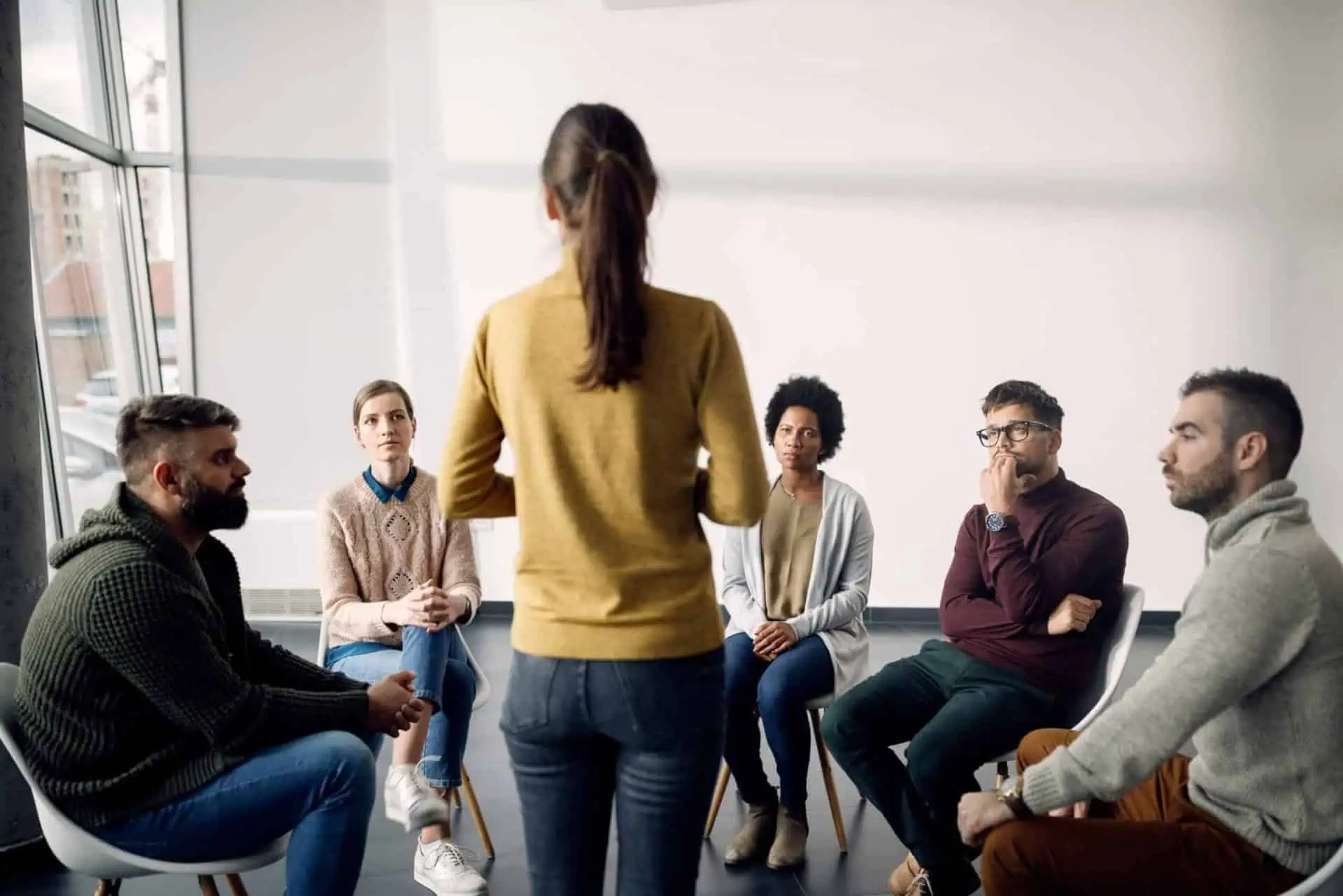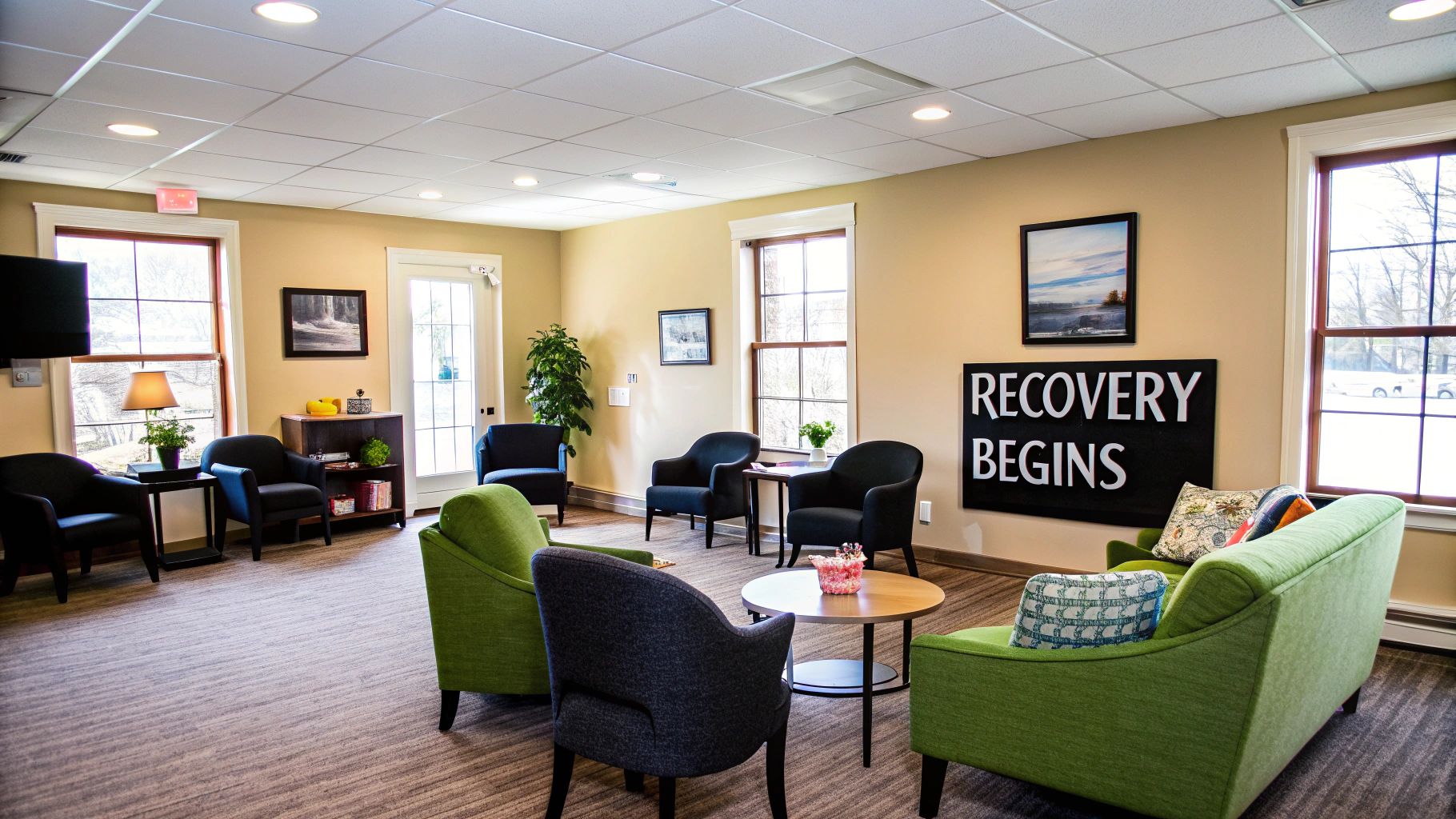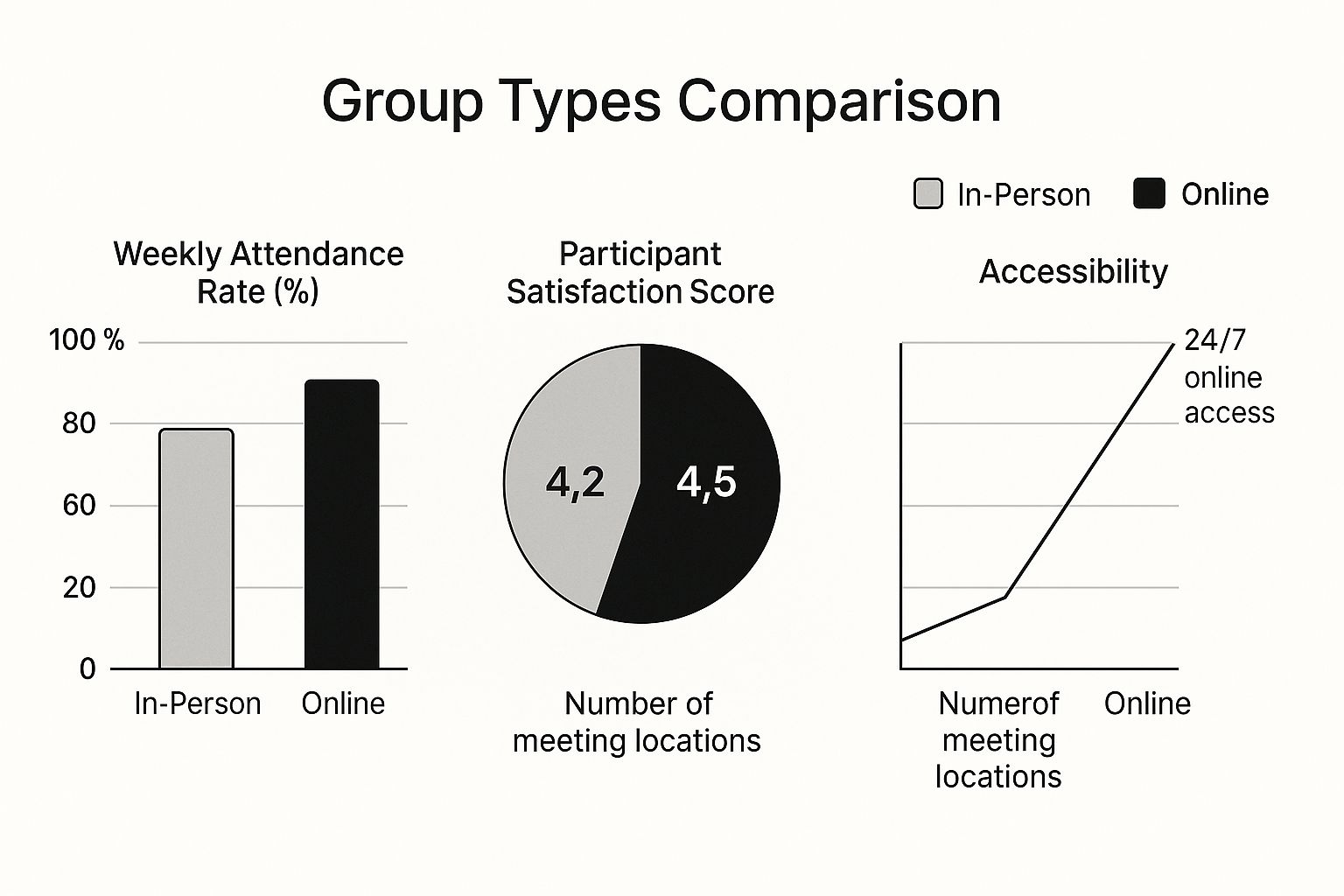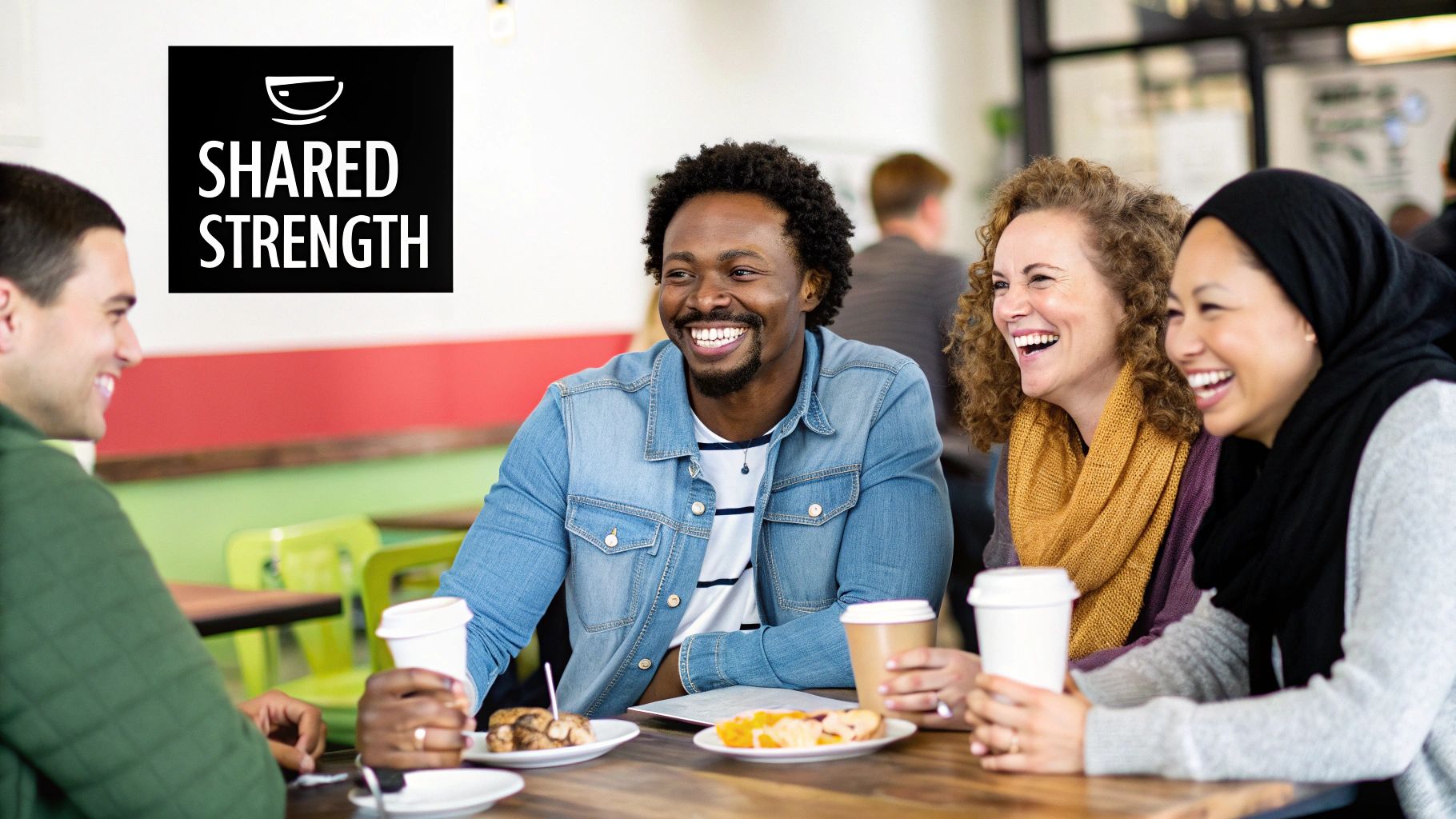
Feeling isolated is one of the heaviest burdens of addiction. It’s a weight that can make you feel like you’re the only person in the world going through it. But you don’t have to carry it alone. Addiction recovery support groups are a powerful lifeline, built on the simple but profound idea of shared experience and providing a safe, non-judgmental space to heal.
You Are Not Alone in Your Recovery Journey

Trying to overcome addiction by yourself can feel like you’re lost at sea on a tiny raft. Every wave of cravings or triggers threatens to pull you under, and the shoreline of sobriety seems impossibly far away. Joining an addiction recovery support group is like being welcomed aboard a sturdy ship with a seasoned crew—people who have navigated the same storms and know the best routes back to land.
This sense of community is the very core of what makes these groups work. These aren’t clinical therapy sessions led by a doctor; they are gatherings of equals, all united by a common goal. It’s here that you connect with people who genuinely understand the daily battles, the quiet victories, and the emotional rollercoaster of recovery because they’re living it, too.
The Power of Shared Experience
There’s an incredible power in hearing someone else put your deepest, most private thoughts and fears into words. That single moment can shatter the shame and isolation that addiction feeds on. In these groups, you’ll find:
- A Safe Haven: A confidential space where you can finally be honest about your struggles without fearing judgment.
- Practical Wisdom: Real-world advice and coping skills from people who have been exactly where you are and found a way through.
- Mutual Encouragement: A community that genuinely celebrates every milestone—no matter how small—and offers a hand when you stumble.
“The proof is in the results. Data from U.S. health agencies reveals that while an estimated 3 out of 4 people with an addiction eventually recover, a huge portion of them get there with the help of groups like Alcoholics Anonymous (AA) or Narcotics Anonymous (NA).”
It’s clear that structured support is a critical piece of the puzzle for lasting change. In fact, recent reports show that about 70% of people who get addiction treatment, which almost always includes group support, report a better quality of life in just one year. You can learn more about these recovery statistics and what they mean at AddictionHelp.com.
Understanding How Peer Support Groups Work
Walking into an addiction recovery support group for the first time can be intimidating, but the way they work is actually refreshingly straightforward. These meetings are built on the simple, powerful idea of peer support. They aren’t formal therapy sessions led by a paid professional; instead, they are gatherings of equals, people united by a common struggle and a shared goal to build a better life.
Think of it like learning a complex new craft, like woodworking. You could read a book, sure, but imagine how much faster you’d learn from an experienced woodworker who has already made all the mistakes and knows every trick of the trade. That’s exactly how peer support works. Members learn from the real-world experiences of others who are walking the same path, just a little further ahead.
At the very core of any good group, you’ll find two unbreakable rules: confidentiality and anonymity. What’s shared in the room stays in the room. This creates a circle of trust where people feel safe enough to be truly vulnerable, without worrying about judgment or gossip.
The Foundation of Trust and Safety
This protected space is the bedrock of the entire recovery process. It gives people permission to talk openly about their deepest challenges, which is a massive step in breaking the cycle of shame and isolation that addiction thrives on. This foundation allows for real connections and mutual encouragement—two things absolutely essential for healing.
When you know you’re among people who not only get it but will also guard your privacy, it empowers you to be honest. This shared promise of confidentiality builds a powerful sense of community and collective responsibility. It reinforces the feeling that you’re all in this together.
What a Typical Meeting Looks Like
While every group has its own personality, most follow a familiar and predictable structure. Having a consistent format helps take the anxiety out of the unknown, letting members focus on why they’re there.
A typical meeting often flows like this:
- Welcome and Opening: A chairperson or leader kicks things off, often with a short reading related to the group’s principles or purpose.
- Introductions: Members might introduce themselves, usually just by their first name to protect their anonymity. Newcomers always get a warm welcome.
- Sharing Session: This is the heart of the meeting. People can volunteer to share personal stories, recent struggles, or small wins. There’s never any pressure to speak—listening is an incredibly powerful way to participate.
- Closing: The meeting wraps up with another reading, a quiet moment of reflection, or sometimes a group prayer or saying that reinforces the message of hope and shared strength.
“A key concept you’ll hear about in many groups is “no crosstalk.” This simply means that people share one at a time about their own journey, without giving direct advice or commenting on what someone else said. This rule keeps the space safe and focused on personal reflection rather than turning into a debate or advice column.”
Finding the Right Type of Support Group for You
Just like every recovery journey is unique, so are addiction recovery support groups. This isn’t about finding the “best” group out there, but about finding the one that truly clicks with your personal beliefs, needs, and how you feel most comfortable communicating. Making this choice is a huge step in building a support system that feels genuine and actually works for you.
The world of support groups is incredibly varied, with different philosophies and structures. Think of it like picking a fitness plan: some people do best with a highly structured, step-by-step program, while others want a more flexible, science-based approach where they set their own goals. Neither is better than the other—they just serve different people.
Comparing Popular Group Models
To help you understand the landscape, we’ve broken down some of the most common group models. The goal here is to see which philosophy resonates with you, as that’s often the most important factor in sticking with a program.
Comparing Popular Addiction Recovery Support Group Models
| Group Type | Core Philosophy | Approach | Best For Individuals Who… |
|---|---|---|---|
| 12-Step (AA, NA) | Spiritual-based recovery. Acknowledges powerlessness over addiction and relies on a “Higher Power” for strength and guidance. | Follows a structured sequence of twelve steps, including self-reflection, making amends, and service to others. Strong emphasis on fellowship. | Thrive with structure, find comfort in spirituality (in any form), and value a strong, consistent community framework for accountability. |
| SMART Recovery | Self-empowerment through science. Uses tools from Cognitive Behavioral Therapy (CBT) to manage thoughts, feelings, and actions. | Focuses on a 4-Point Program: 1) Building motivation, 2) Coping with urges, 3) Managing thoughts and behaviors, 4) Living a balanced life. | Prefer a secular, evidence-based approach, want practical tools to feel in control of their recovery, and are motivated by self-reliance. |
| Women for Sobriety (WFS) | Female-centric empowerment. Addresses the specific needs of women in recovery, focusing on self-esteem and positive thinking. | Utilizes a set of “Thirteen Acceptance Statements” to challenge negative self-talk and build a new, positive self-image. | Are women who feel their recovery is tied to issues of self-worth and confidence, and who seek a supportive, all-female environment. |
As you can see, the core difference often comes down to the source of strength. 12-Step programs look to a spiritual source for guidance, while secular groups like SMART Recovery emphasize inner strength and scientific tools to overcome addiction. The right choice is simply the one that speaks to your own worldview.
Making Your Choice: In-Person or Online
Beyond philosophy, the next big choice is how you’ll meet: in person or online. Each has its own distinct advantages.

While the data suggests in-person groups might have a slight edge in satisfaction, you can’t ignore the power of online platforms offering 24/7 accessibility. For many, that constant access is a critical lifeline, especially in a moment of crisis.
This trend toward more accessible support is taking hold globally. In the United Kingdom, for instance, organizations are pushing for more community-led recovery that includes instant digital help, like dedicated WhatsApp groups for members. They recognize that a strong, responsive network is absolutely key to long-term success. You can learn more about addiction rehabilitation innovations and see how technology is shaping the future of recovery.
Ultimately, finding the right fit might take a little trial and error. Don’t be afraid to visit a few different meetings—both online and in-person—to see where you feel most comfortable, supported, and ready to continue your journey.
The Real-World Benefits of a Support Community

So what’s the big deal with addiction recovery support groups? Why are they so effective? The magic goes way beyond just having somewhere to be. These communities provide powerful psychological support that directly pushes back against the shame and loneliness that fuel addiction.
When you join a group, it’s like walking out of the shadows and into a room of people who just get it. They already understand the part of your story you thought you could never explain. That shared experience instantly lifts the crushing weight of isolation. All of a sudden, you’re not the only one, and that feeling alone is a huge catalyst for healing.
Building a New, Sober Network
One of the first things you’ll gain is a brand-new, sober social circle. Addiction has a way of shrinking your world until you’re only surrounded by people or places that encourage substance use. A support group helps you forge new connections with people who are all pulling in the same direction: toward a healthy, sober life.
This new network gives you things you might not have had in years:
- Positive Peer Pressure: A gentle, encouraging nudge from people who want to see you succeed.
- Sober Activities: Real opportunities to socialize and have fun without drugs or alcohol.
- An Instant Lifeline: A list of people you can actually call when you’re hit with a craving or just having a bad day.
This community becomes your safety net. It’s there to catch you when you stumble and to genuinely celebrate your victories, big or small. It’s where you don’t just learn how to stop using—you learn how to start living again.
“A supportive community helps individuals focus on their recovery goals, creating a sense of belonging that counteracts feelings of isolation. Studies indicate that positive interactions within support groups can provide vital encouragement, making it less likely for individuals to return to substance use.”
Learning Coping Skills That Actually Work
Listening to real stories from other members is like getting a masterclass in relapse prevention. People openly share what works for them when they face triggers, stress, or intense cravings. You’ll pick up practical, real-world strategies you can put into practice immediately.
This peer-to-peer wisdom often hits home harder than clinical advice. When you hear someone who’s been exactly where you are explain how they got through a tough spot, the lesson just sticks. The group also provides a gentle sense of accountability and a reliable structure that helps you maintain sobriety for the long haul.
This community-based framework is quickly becoming a cornerstone of modern treatment. Around the world, addiction care is weaving support groups together with other therapies like trauma-informed care and meditation to treat the whole person. And the need is urgent: recent data shows that over 95% of people who needed drug rehab in 2023 didn’t receive it, highlighting the massive gap these community groups help fill. You can discover more about these new advances in addiction treatment on EvolveIndy.com.
A Practical Guide to Finding Your First Meeting
Taking that first step into an addiction recovery support group can feel like the hardest part of the whole journey. We get it. The good news? Finding a meeting is more straightforward than you might think, and you’re in the driver’s seat the entire time.
This guide is designed to cut through the noise and show you exactly how to find a group that feels right, whether it’s in your neighborhood or online.
The most reliable place to start is right at the source. The official websites for these organizations have the most accurate, up-to-date meeting finders. No more guesswork.
Official Meeting Finders
Here are direct links to the official directories for some of the most well-known support groups. These tools let you search by your location, the type of meeting you want (like online or in-person), and sometimes even by a specific focus, like groups for beginners or young adults.
- Alcoholics Anonymous (AA):Find a local A.A. resource to connect with meetings in your area.
- Narcotics Anonymous (NA): Use the NA Meeting Search to locate both in-person and virtual options all over the world.
- SMART Recovery: Explore the SMART Recovery meeting finder for science-based, secular groups.
Don’t be afraid to shop around. Finding the right community is a lot like finding good friends—it might take a few tries before you land in a room where you feel truly comfortable and understood.
What to Look for in a Group
So you’ve attended a meeting or two. Now what? It’s time for a gut check to see if it’s the right long-term fit. Every group has its own personality, so pay close attention to how you feel, both during the meeting and after you leave. The goal is to find a place that feels safe, welcoming, and gives you a sense of hope.
“A simple self-check after each meeting can make all the difference. Ask yourself: “Did I feel seen and heard, even if I just listened? Did the message resonate with me? Do I feel even slightly more hopeful than I did before I walked in?” Your honest answers are your best guide.”
To help you size up a group, think about these key factors:
- Group Size: Are you someone who thrives in a large, energetic meeting? Or do you prefer a smaller, more intimate setting where everyone gets a chance to share? There’s no right or wrong answer—just what’s right for you.
- Atmosphere and Tone: Was the group warm and positive? Or did it feel a bit cliquey or critical? The right group should feel supportive, never judgmental.
- Message Resonance: Did the stories and advice connect with your own experiences? You’re looking for that “I can relate to that” feeling, not a sense of being completely out of place.
Choosing a support group is a deeply personal decision. Trust your instincts. If a meeting doesn’t click, that’s perfectly okay. There are countless others out there. Keep looking, and you will find a community that can truly anchor your recovery.
What to Expect at Your First Support Group Meeting
Walking into your first support group meeting can be nerve-wracking. I get it. A lot of that anxiety just comes from not knowing what’s behind the door. Once you understand what a typical meeting looks like, it takes a lot of the fear out of the equation and makes taking that first step much easier.
The most important thing to know is this: you are in control.
One of the biggest fears people have is being forced to talk. Let me put that to rest right now—you will never be put on the spot or pressured to share your story. Plenty of people go to their first few meetings just to listen. That’s more than okay; it’s a powerful way to start. Just being in that room and hearing that you aren’t alone is a massive step forward.
The Flow of a Typical Meeting
While every group has its own unique flavor, most follow a simple, predictable structure that helps everyone feel comfortable.
When you first walk in, you’ll probably see people milling around and chatting informally, just like any other gathering. The meeting usually kicks off with a brief welcome from the person leading it (the chairperson), followed by a reading of the group’s core mission or principles.
After that, the meeting typically opens up for members to share. This is where you’ll see the “no crosstalk” rule in action. People share their own experiences, one at a time, without anyone else jumping in to interrupt, comment, or offer advice. It’s not a debate or a therapy session—it’s a space for personal reflection, ensuring everyone feels safe to be vulnerable.
“You might hear people talk about a “Higher Power,” especially in 12-Step programs. This concept is deeply personal and is completely open to your own interpretation. For some, it’s God. For others, it’s the universe, the collective wisdom of the group, or simply a force greater than their own addiction. Many atheists and agnostics find incredible value in addiction recovery support groups by defining this concept in a way that resonates with them.”
The meeting will end with a closing statement. Sometimes, members will hold hands for a short prayer or saying, but there’s zero pressure to participate if you don’t feel comfortable.
Just remember, every single person in that room was a newcomer once. They know exactly how you feel. Your presence alone is a victory.
Of course. Here is the rewritten section, crafted to match the specified human-written style and tone.
Getting Answers: Common Questions About Recovery Support Groups
Taking that first step into a support group can bring up a lot of questions. It’s completely normal to feel a bit uncertain. Let’s walk through some of the most common concerns to clear things up and help you feel more comfortable moving forward.
Are These Groups Religious?
That’s a big one, and the short answer is: not necessarily. While the most well-known 12-Step programs, like Alcoholics Anonymous, do talk about a “Higher Power,” they are designed to be inclusive. You’ll find people from every walk of life in those rooms, including agnostics and atheists.
But if a spiritual angle isn’t for you, there are fantastic secular options. Groups like SMART Recovery, for example, steer clear of spirituality altogether and focus squarely on evidence-based cognitive techniques. The bottom line is, you can absolutely find a group that fits your personal beliefs.
Is There a Fee to Attend?
No. The vast majority of these groups are completely free. You’ll often hear that they are “self-supporting,” which means they run on voluntary donations.
You might see a basket passed around to help cover the cost of rent for the meeting space or to buy coffee, but you are never required to put anything in. Your presence is what matters, not your wallet.
“It’s important to know the difference between a support group and group therapy. A support group is a peer-to-peer meeting—people with shared experiences helping each other. Group therapy, however, is a clinical service led by a licensed therapist and is a form of professional treatment.”
Can I Attend if I Am Still Using?
Yes, absolutely. For most groups, the only real requirement is a desire to stop drinking or using. That’s it.
Many, many people walk into their first meeting while still actively struggling. You will be welcomed, not judged. Just look for “open” meetings, which anyone can attend. “Closed” meetings are typically reserved for those who have already identified that they have a problem with substance use.
If you or someone you care about is battling addiction, you don’t have to navigate this alone. Addiction Helpline America connects you with compassionate, trusted recovery professionals who can guide you. Visit Addiction Helpline America to take the first step toward a healthier, sober life.
Our helpline is 100%
free & confidential
If you or someone you care about is struggling with drug or alcohol addiction, we can help you explore your recovery options. Don’t face this challenge alone—seek support from us.
Call Our 24/7 Free & Confidential Addiction Support Helpline
Resources
Will my insurance
cover addiction
treatment?
We're ready to help
Find the best
drug or alcohol treatment
center
Are you or a loved one struggling with addiction? Call today to speak to a treatment expert.













